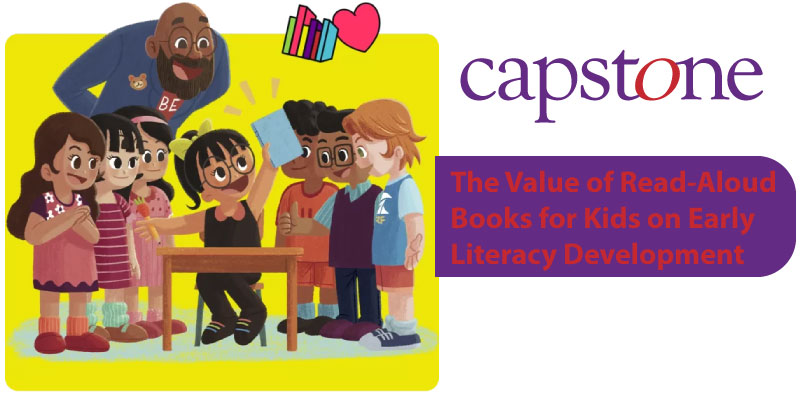Read-aloud books for kids are very effective in encouraging a love of reading in young children. They act as a fun transitional link between a child’s early language development and eventual independence in reading. Let’s examine how children’s read-aloud books impact their early literacy development and foster a love of reading that lasts a lifetime.
Building Essential Literacy Skills
- Auditory Processing: Read-aloud stories aid children in their recognition of linguistic patterns, such as speech rhythm and sentence structure. This helps them transition to being independent readers later on in their journeys.
- Phonological Awareness: One needs to learn to hear and distinguish between the different sounds that make up words. Read-aloud children’s books aid in the development of their understanding of these sounds and serve as a solid foundation for phonics.
- Attention span: Learners who often hear stories might develop their capacity for sustained focus. Their increased attention span is advantageous for their general learning and concentration abilities in addition to helping with literacy development.
Expanding Vocabulary in a Natural Way
Youngsters’ minds are like sponges; they take up new information really quickly. Children who listen to books aloud are exposed to a broad vocabulary that is frequently more sophisticated than what they would hear in everyday conversation.
- Diverse Language Use: Read-aloud books for kids frequently use eloquent, descriptive language that isn’t always used in normal conversation. The exposure to a variety of narrative techniques, such as dialogue-driven scenes and poetic prose, enhances children’s comprehension of language and expression.
- Building Strong Comprehension Skills
- Following along with a story is a workout for a child’s comprehension muscles. They learn to track the sequence of events, make predictions, and identify relationships between characters and situations.
- Creating Personal Connections: Children frequently draw parallels between the story and their own experiences. A youngster is more inclined to consider their ideas, emotions, and behaviors when they learn about the experiences and feelings of a fictional character.
Choosing the Right Read-Aloud Books for Kids
Selecting the Best Children’s Audio Books should include:
- Age-appropriate content to make sure that the book’s themes, language, and length are appropriate for the developmental stage and age of the kid.
- Whether your kids enjoy nonfiction, fairy tales, or action stories, providing books that suit their interests will enhance the reading experience.
- If you listen to audiobooks, try to find ones with expert narrators so that the experience will be more thrilling and dramatic.
Including Read-Aloud Books in Everyday Activities
It can be simple and enjoyable to incorporate read-aloud sessions into your child’s everyday routine:
- Shared Reading: Assist youngsters in following along by matching an audiobook with a printed book. This strengthens the connection between written and spoken language.
- Independent Listening: Encourage kids to use headphones to listen to read-aloud books during quiet time or on long car rides.
- Choose Capstone Library: Sites such as Capstone Library provide a vast array of books narrated by professionals, offering instructors, parents, and students excellent support. It’s simple to include read-aloud experiences into everyday routines by using digital libraries and encouraging individual listening. In general, read-aloud audiobooks encourage a passion for reading and are popular in education institutes across Dubai.
So, whether you’re reading to your child or letting them enjoy an audiobook, you’re giving them a strong start on their journey toward lifelong learning and a passion for books.







Recent Comments